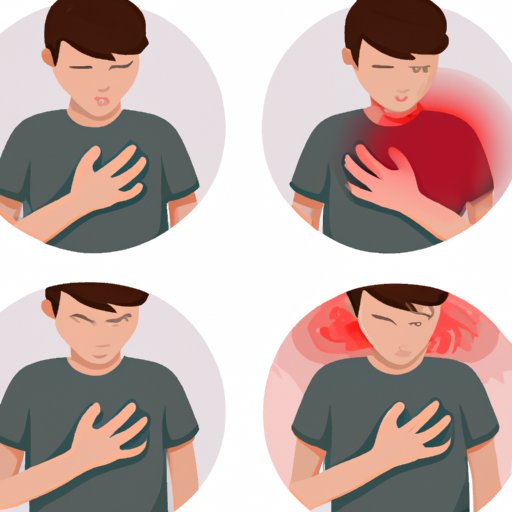
I. Introduction
Have you ever experienced a cough that just won’t go away, chest pain, or shortness of breath? These could be signs of a chest infection, a common respiratory illness that affects millions of people each year. It’s important to recognize the symptoms of a chest infection because, without proper treatment, it can lead to serious health complications. In this article, we’ll explore the top 10 signs of a chest infection, how to differentiate it from other respiratory illnesses, and when to seek medical help.
II. 10 Telltale Signs of a Chest Infection: How to Spot the Symptoms
A chest infection occurs when the airways in your lungs become inflamed. This can be caused by bacteria, viruses, or other irritants. Here are the top 10 symptoms that might indicate a chest infection:
- Coughing, which may produce mucus and last for several weeks
- Chest pain or discomfort when breathing or coughing
- Shortness of breath or difficulty breathing
- Fever or chills
- Fatigue or weakness
- Loss of appetite
- Nausea or vomiting
- Sore throat
- Muscle aches and pains
- Headache
If you experience one or more of these symptoms, it’s important to pay attention and seek medical help if necessary.
III. Is It a Cold or Something More? Recognizing the Symptoms of a Chest Infection
It can be difficult to differentiate between a chest infection and other common respiratory illnesses, such as a cold or the flu. However, chest infections are usually characterized by specific symptoms, such as mucus production and wheezing. Here are some other common symptoms that might indicate a chest infection:
- Difficulty breathing, especially when lying down
- Tightness or pressure in the chest
- Rapid breathing or shortness of breath
- Bluish or grayish tint to the skin, lips, or fingernails (a sign of low oxygen levels)
- Coughing up blood or blood-streaked mucus
If you’re experiencing these symptoms, it’s important to seek medical help immediately.
IV. When to Seek Medical Help: Identifying Symptoms of a Serious Chest Infection
Although many chest infections can be treated at home, some can be serious and require medical attention. Here are some symptoms to watch out for:
- Fever higher than 102°F
- Chest pain that is severe or getting worse
- Difficulty breathing or shortness of breath, especially at rest
- Confusion or disorientation
- Seizures
- Blue lips or skin
- Rapid heartbeat
- Coughing up blood
If you’re experiencing any of these symptoms, call your doctor or go to an urgent care center immediately.
V. Chest Infection Symptoms: A Comprehensive Guide
Now let’s take a closer look at each of the symptoms mentioned above:
- Coughing: A cough caused by a chest infection may produce phlegm or mucus and last for several weeks. Cough suppressants or expectorants may be helpful in managing the cough, depending on the type of cough you have.
- Chest pain: Chest pain or discomfort when breathing or coughing is common with chest infections. Over-the-counter pain relievers such as acetaminophen or ibuprofen may help ease the pain.
- Shortness of breath: Difficulty breathing or shortness of breath can be a sign of a more serious chest infection. If you’re experiencing shortness of breath at rest, call your doctor or seek medical help immediately.
- Fever or chills: A fever is a sign that your body is fighting off an infection. Over-the-counter fever reducers can help, but if the fever persists or goes above 102°F, seek medical help.
- Fatigue or weakness: Feeling weak or fatigued is common with chest infections and is a sign that your body is focusing its energy on fighting the infection.
- Loss of appetite: Chest infections can cause a loss of appetite. It’s important to stay hydrated and try to eat small, frequent meals.
- Nausea or vomiting: Nausea or vomiting is a sign that your body is reacting to the infection. It’s important to stay hydrated and seek medical help if vomiting persists or is severe.
- Sore throat: A sore throat is common with chest infections and can be managed with over-the-counter pain relievers and throat lozenges.
- Muscle aches and pains: Chest infections can cause muscle aches and pains, which can be managed with over-the-counter pain relievers.
- Headache: Headaches are common with chest infections and can be managed with over-the-counter pain relievers.
While most chest infections can be managed at home with rest, hydration, and over-the-counter medications, it’s important to seek medical help if your symptoms are severe or not improving.
VI. Feeling Sick? Here’s How to Know If You Have a Chest Infection
Recognizing the symptoms of a chest infection is an important step in managing the illness. While many chest infections can be managed at home, it’s important to seek medical help if your symptoms are severe or not improving. Remember to stay hydrated, rest, and take over-the-counter pain relievers as needed. If you’re concerned about your symptoms, don’t hesitate to call your doctor or seek medical help.




